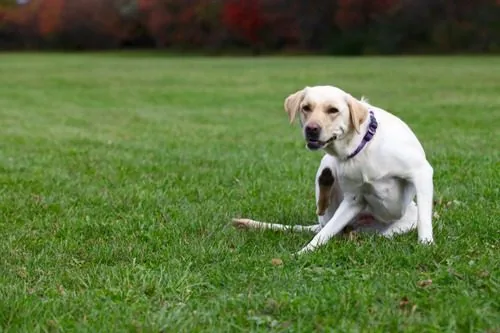Dog Constipation: Why Your Dog Can’t Poop
If you suspect that your dog is constipated and can’t poop, or you have noticed that she is straining or not pooping as often as you think she should, there may be several reasons why. Constipation does happen occasionally in dogs, and usually, it’s something that your best friend can recover from fairly quickly on her own.

However, constipation issues in dogs can be a sign of a medical problem as well, and if you think your dog may be ill, contact your local veterinarian as soon as possible.
What are the Symptoms of Dog Constipation?
The symptoms of constipation in dogs include the following:
Not Defecating
This is fairly obvious, and sometimes, for whatever reasons, dogs will hold their poop. If you don’t see your dog poop for 48 hours, she may be constipated and you may want to contact your veterinarian.
You might also notice your dog dragging or scooting her bum along the ground, or licking her rear end. This also can be a sign of constipation or impacted anal glands.
Straining to Defecate
If your dog is trying to poop, strains to defecate, or crouches to poop but then walks away, this can also be a sign of constipation.
Painful or Whining While Trying to Defecate
If your dog whines or cries out in pain while trying to poop, she may be constipated, or have another health problem. In this case, it’s best to contact your veterinarian.
Stools are Hard, Compacted, or Dry
If your dog’s stool is hard and compacted, she may be slightly constipated, and if it continues, contact your veterinarian. Your veterinarian may recommend a stool softener or a higher fiber diet.
What Causes Constipation in Dogs?
There are several causes of constipation in dogs, including:
Neurological Issues
Older dogs may suffer from neurological issues, and if your dog suffers from back problems or a degenerative neurological condition, she may have a droopy tail, weakness, or pain in her hindquarters, and these conditions may contribute to why you’re dog won’t poop.
Too Much Fiber
Dogs can become constipated if they eat too much fiber, which can be caused by eating low-quality dog food or scraps from the table.
Not Enough Fiber
Dogs that eat too little fiber can also become constipated, and this is why it’s important to feed your dog good-quality food with adequate fiber.
Matted Fur on the Hind End
Dogs whose fur is extremely matted near the rear end can become constipated if the fur mats block the anus or rectum. In this case, you may need a professional groomer or a vet to help you get her fur back under control.
Impacted Anal Glands
Dogs with full or impacted anal glands may also experience trouble pooping and will require an anal gland expression by a veterinarian or a licensed groomer.
Ingestion of a Foreign Body
If your dog likes to eat sticks, rocks, toys, or other inappropriate items, she can develop a GI obstruction, and this can develop into a veterinary emergency.
Tumors
Dogs with rectal tumors, or who have growths on or around the anus may develop an obstruction because of the tumor. Anal tumors must be treated by a veterinarian.
How Do I Treat Constipation in My Dog?
Treating constipation in your dog depends on the underlying problem. For example, if your dog has an anal or rectal abscess, your veterinarian may drain it and prescribe antibiotics. If your veterinarian believes diet is the cause, then adding a bit of fiber to regular meals may be recommended, or an over-the-counter stool softener to get things moving.
There are several things you can do to prevent constipation in your dog at home, but it’s important to consult your veterinarian first.
Regular Exercise
Sometimes dogs get over their problems of not being able to poop with regular exercise and walks. Exercise stimulates GI (gastrointestinal) motility, and sometimes lack of exercise can contribute to constipation.
Canned Pumpkin
An easy, at-home treatment for constipation is to add canned pumpkin to the diet. Pumpkin is a high-fiber food and is perfectly safe for a dog to ingest, but make sure to purchase pumpkin that has no added salt or sugar.
Stool Softeners
Stool softeners should only be given upon recommendation from your veterinarian. Some dogs can take human-grade stool softeners, and others cannot.
Feed Good Quality Dog Food
Sometimes poor quality food can a reason why your dog won’t poop, and your veterinarian may suggest trying a prescription dog food that contains more fiber than regular dog food.
When Should I Call My Veterinarian?
Constipation can occur in dogs, and sometimes it can resolve with added fiber, but it can also be a sign of a health issue, and if left untreated, constipation can cause damage to various body systems. If your dog has not defecated for 48 hours, she can be at risk of developing obstipation (the inability to poop), which can cause a backup, and cause your dog to stop eating and become very ill.
The backup of bodily waste is a medical emergency because bodily waste contains large amounts of bacteria and waste products, these products can get into the bloodstream, causing sepsis, a life-threatening condition that can lead to death if left untreated.
If you notice that your dog won’t poop, it’s important to call your vet as soon as possible so they can help figure out the underlying cause and develop the best treatment plan for your pet.
How Do I Prevent Constipation in My Dog?
The best way to keep your dog regular is to consult your veterinarian about diet, fiber, and exercise, and pay attention to your dog’s stools, and take note if you recognize anything abnormal. If you have any questions or concerns about your dog and constipation, contact your veterinarian.
Recent Posts
About The Village Vets
The Village Vets is a network of animal hospitals based in Atlanta, GA and the surrounding area. We offer honest, excellent service to our clients in a comfortable, friendly atmosphere. To learn more about our locations and how we can better serve you and your pet, click the button below.
Share This Post
Recent Posts
About The Village Vets
The Village Vets is a network of animal hospitals based in Atlanta, GA and the surrounding area. We offer honest, excellent service to our clients in a comfortable, friendly atmosphere. To learn more about our locations and how we can better serve you and your pet, click the button below.



